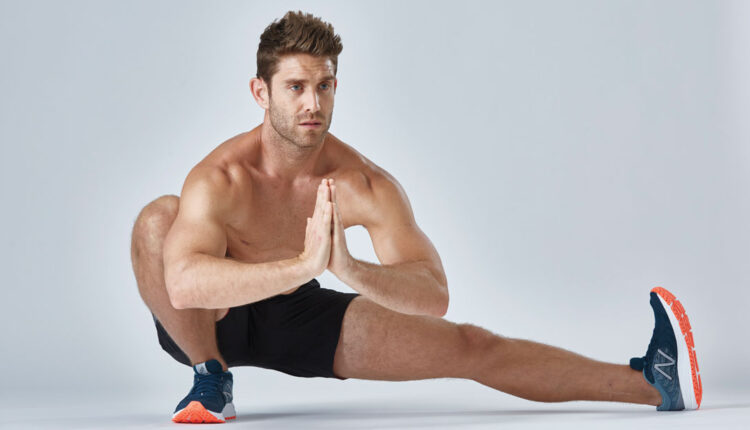Mobility and strength are two sides of the same coin. Good strength training will improve overall mobility when the exercise is performed through a full range of motion. And uncomplicated mobility training improves your ability to go through a full ROM with strength exercises. What does that all mean for you?
It means better health and more gains for you.
There are a few exercises where mobility and strength meet head-on, with the goblet squat being the No. 1 example. Not only do they improve your mobility and strength, but they improve it for other exercises, too. The adductors, commonly known as the groin muscle, often get neglected when improving hip mobility and performance in and out of the gym.
When they are tight or injured, you’ll know about it. Then, a steady diet of mobility and lateral exercises like side lunges and Cossack squats will be on the training menu. If you want to step up your adductor game before that happens, Justin Farnsworth, DPT, CSCS, and Board Certified Sports Clinical Specialist and coach with over 20 years of experience, has the exercise for you.
Benefits of the Cossack Squat
- “Cossack squats are gold,” explains Farnsworth.
- Gets people in a plane of motion we typically neglect, especially as we age and sit in chairs.
- Absolutely MONEY for hip joint inferior capsule mobility, adductor mobility on the stretched leg, and hip external rotation on the loaded leg.
- Gets people into a more “athletic” position of lateral motion.
- IMO, it’s a movement EVERYONE should be doing and doing at least weekly. With mobility and ROM access, if you never lose it, you never need to get it back.“
Stationary Box Cossack Squat
“The setup of the stationary box Cossack squat accomplishes two main purposes,” says Farnsworth.
“First, it acts as a bridge to getting people into a deeper Cossack if they can’t access it due to weakness, stiffness, balance, pain, or coordination. The box provides a constraint and target while queuing a weight shift backward.
Second, this setup allows us to work on hip external rotation, which is a ROM of the hip that is commonly lost and limits squat depth and access. The initial portion of a squat requires hip ER, and as we get deeper into flexion, it requires IR. This setup allows us to take a bullseye approach to the specific limitation of ER loss.
This variation will target the adductors and quads due to the higher ROM. With a unilateral load, we will get anti-rotation core benefits, although those are secondary.” explains Farnsworth.
Stationary Box Cossack Squat Form Tips
“Grab a box and sit on the corner with your glutes directly above it (allows you to sit DOWN vs. just back). Do this FIRST to ensure you are at a height where you do not get a pinch in your hips.
Then, plant the other leg wide in a groin stretch position with the heel down and toes forward. Have a DB or KB in the arm of the working leg side, and lunge until you feel your glutes touch the box. Sit on the box and offload about 50% of your body weight onto the box.
Let the other arm come out in front as you lunge to counterbalance your body, and as you lunge back, the straighter leg can do one of two things depending on your comfort level and mobility.
- You can keep the toes forward with the heel down (seen in the video), requiring MORE adductor mobility.
- You can rotate your hip, turning the toes to the sky, and usually require less adductor mobility.” says Farnsworth.
Set and Reps Suggestions
Farnsworth suggests this works well as a secondary accessory movement done with either strength or hypertrophy with mobility focus in mind. For strength, perform four sets of six to eight reps. For hypertrophy and mobility, focus on three sets of 12-plus reps, trying to inch deeper each set.


Comments are closed.